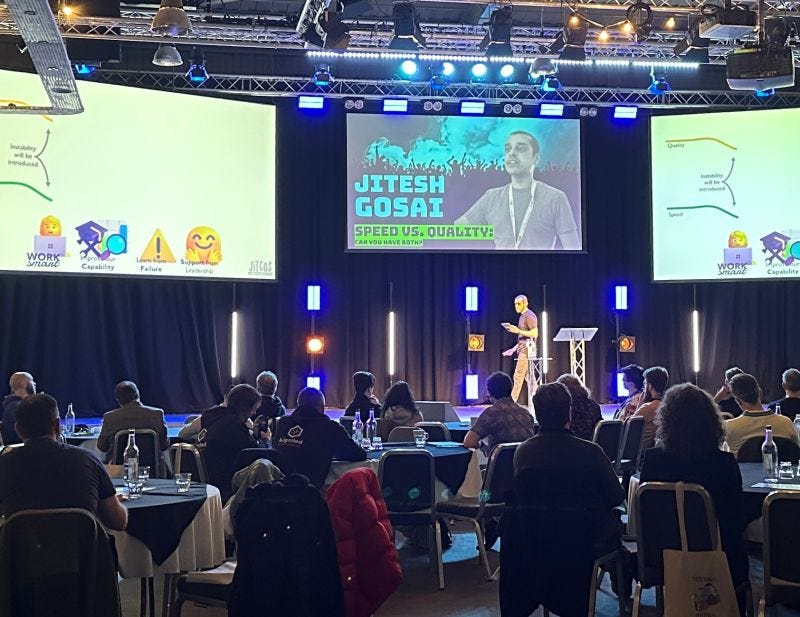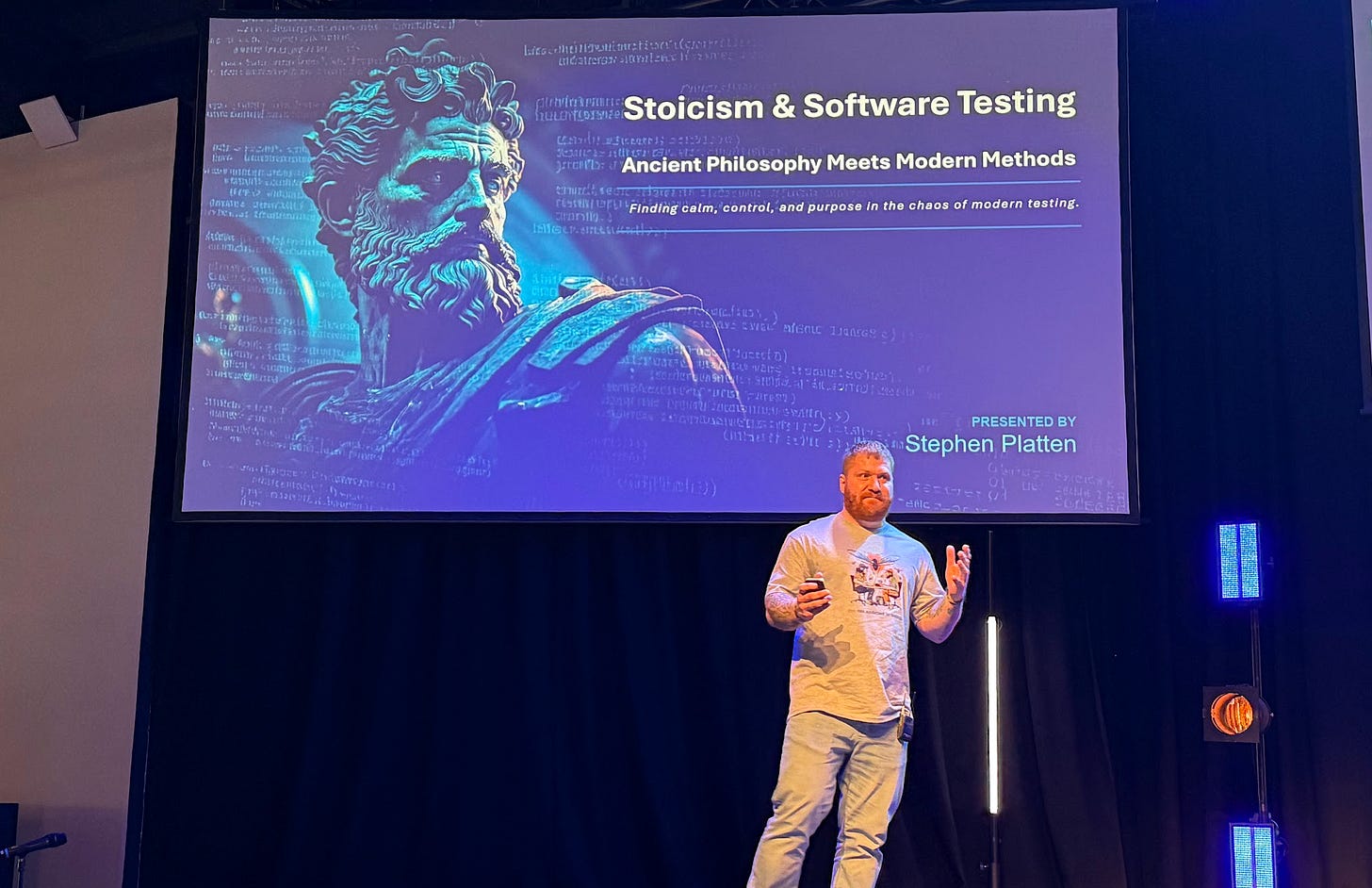Three Quality Engineering Lessons from PeersCon 2025
Mindset, stoicism and what to communicate when there's nothing to communicate - my three takeaways for quality engineers from PeersCon25
Last year, I was lucky enoaugh to speak at and attend the first-ever PeersCon, and honestly, I didn’t think it could get any better. But this year? It absolutely delivered.
See Three Ideas for Quality Engineers to get a feel for what last year was like.
From thought-provoking talks to engaging discussions (and a few unexpected lessons from my own session—more on that later), it was a day packed with learning, connection, and inspiration. Here are three of my highlights:
The Quality Engineering Mindset
The keynote was by Kat Obring, Debugging the Mind: Teaching Developers to Think Like Testers. I've been following Kat on LinkedIn for the last few years, and she consistently shares great content on agile coaching and quality engineering—I highly recommend giving her a follow.
Kat's views really echo my own: to foster quality engineering, you need to be curious about what developers do and humble enough to share what you don’t know. Just as testers benefit from adopting a developer mindset, developers gain from thinking like testers. This mutual exchange builds empathy—by working, learning, and teaching together, we strengthen our ability to collaborate effectively.
Curiosity, humility, and empathy are essential mindsets for quality engineers. They help create a more generative culture within teams, fostering an environment of shared learning and improvement. I plan to write more about this QE mindset and generative cultures in the coming weeks, so stay tuned!
If you'd like to read more about what Kat shared, check out my notes from her talk.
Is Quality Engineering Stoicism in Disguise?
Stephen Platten took us on a philosophical tour of Stoicism (this wiki page is a great primer) and highlighted how its principles align with quality engineering. The three he shared were: Control vs. Influence, Love Your Fate (Amor Fati), and Pragmatism.
Control vs. Influence reminds me that as quality engineers, we can’t control the product, but we can influence it. Instead of focusing on what we can’t change, we should concentrate on where we can make a difference—like shaping healthier work environments that lead to better outcomes.
Love Your Fate (Amor Fati) aligns with quality engineering’s role in studying how quality is created, maintained, and lost. Instead of wishing things were different, we embrace reality and use that understanding to influence future outcomes.
Pragmatism is about accepting that failure is inevitable in complex systems. Quality engineers shouldn’t be surprised when things go wrong—we should expect it, learn from it, and help our teams navigate challenges rather than just identifying issues for others to fix.
If you'd like to learn more about Stephen's talk, then take a look at my notes from his talk.
What to Communicate When There’s Nothing to Communicate
The second keynote of the day was from Veerle Verhagen. She’s involved in line fighting—which, from what I gathered, is Viking re-enactment battles. She used these chaotic battles as a metaphor for software development, where communication is critical to success.
While building software isn’t a fight, it is chaotic, and key information often fails to reach the right people—especially during incidents. Veerle’s talk was packed with practical advice on improving communication within teams. From a quality engineering perspective, it reinforced the importance of building quality into people.
One standout lesson was what to communicate when there’s nothing to communicate. She shared an example of a major outage that her team experienced. Stakeholders felt left in the dark, but the team hadn’t shared updates because they had no new information. Veerle’s advice? Keep communicating—even if it’s just to say, “No change.”
Regular updates reassure stakeholders that progress is being made. It’s also important to communicate when you can no longer support a task and need someone else to take over, or when you can support and are actively working on it. Similarly, sharing what has been completed—while noting what still needs to happen—helps teams stay aligned. It seems obvious when explained, but it’s often overlooked.
Veerle shared loads more practical takeaways so check out my notes for the talk.
Speed vs. Quality – Can You Have Both?

I spoke about Speed vs. Quality (see my further reading list for more links). But let’s just say… things didn’t go exactly to plan:
I built my slides on a Mac using Mac-based emojis—only to find out that Windows emojis don’t translate the same way (you can just make it out in the image above). My slides worked, but they looked like I threw them together five minutes before presenting.
My mic decided it didn’t like my usual intonation. Whenever I tried to add energy to my voice, I got feedback, so I had to speak much more softly than usual.
But despite these hiccups, the questions and feedback were really positive—so people still got value from it! Fail for the win!
Honourable Mentions
Lauren Borodajko delivered a fantastic talk on Nonviolent Communication (this Wikipedia overview is a good primer). She explained how structuring our responses can improve the way we give and receive feedback. It really got me thinking about how crucial feedback is in teams—and how it’s a skill that needs to be nurtured.
The day closed with three inspiring stories from Chris Briggs, Tom Game, and Linda Van De Vooren, sharing their journeys in testing, what they’ve learned, and how far they’ve come - thank you for sharing your stories. It's great hearing how others are making it in the industry.
Get Involved
PeersCon will be back in 2026. My advice? Get involved. Submit a talk, run a workshop, or volunteer to help organise. You’ll learn a ton, meet brilliant people, and best of all—it’s affordable. You could send your whole team for the price of a single big conference ticket. Getting involved with conferences is a great way to step out of your comfort zone and take risk in a safe and supportive environment. The Testing Peers are a great bunch of folks and will give you all the support you need.
I’m already thinking about what to submit next year. What about you? 👀







